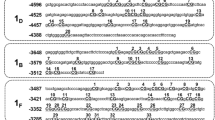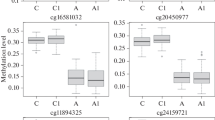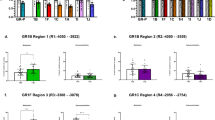Abstract
Aggressive behaviour is a serious threat to the personal safety and property of others due to the potential that the assailant may hurt people, himself/herself or objects, and aggression has always been one of the focuses of research and concern. Accumulating evidence suggests that the hypothalamic-pituitary-adrenal (HPA) axis plays a major role in the development, elicitation, enhancement and genetic susceptibility of aggressive behaviour in humans and animals. GR (NR3C1) plays a crucial role in controlling HPA activity, which directly affects aggressive behaviour. Here, we investigated the methylation state of the NR3C1 gene promoter region and its role in aggressive behaviour in adult males for the first time by applying a case-control approach (N = 106 controls, N = 104 patients). Methylation of NR3C1 was measured in peripheral blood samples at exons 1D, 1B and 1F via sodium bisulfite treatment combined with the MethylTarget method. Methylation of the NR3C1 gene was significantly correlated with aggressive behaviour, and the methylation levels of 1D, 1B and 1F were upregulated in the aggressive behaviour group, intentional injury subgroup and robbery subgroup, and the significance varied. In addition, multiple CpG sites were found to be significantly associated with aggressive behaviour. These results suggest that epigenetic aberrations of NR3C1 are associated with aggressive behaviour, and epigenetic processes might mediate aggressive behaviour by affecting the activity of the HPA axis. This correlative study between DNA methylation of the NR3C1 gene and aggressive behaviour in patients may be helpful for forensic assessments.



Similar content being viewed by others
References
Provencal N, Booij L, Tremblay RE (2015) The developmental origins of chronic physical aggression: biological pathways triggered by early life adversity. J Exp Biol 218(1):123–133
Bohnke R, Bertsch K, Kruk MR, Naumann E (2010) The relationship between basal and acute HPA axis activity and aggressive behavior in adults. J Neural Transm 117(5):629–637
Chen B, Gu T, Ma B, Zheng G, Ke B, Zhang X, Zhang L, Wang Y, Hu L, Chen Y, Qiu J, Nie S (2013) The CRHR1 gene contributes to genetic susceptibility of aggressive behavior towards others in Chinese Southwest Han population. J Mol Neurosci 52(4):481–486
Dionne G, Tremblay R, Boivin M, Laplante D, Pérusse D (2003) Physical aggression and expressive vocabulary in 19-month-old twins. Dev Psychol 39(2):261–273
Hicks BM, Krueger RF, Iacono WG, McGue M, Patrick CJ (2004) Family transmission and heritability of externalizing disorders: a twin-family study. Arch Gen Psychiatry 61(9):922–928
Lacourse E, Boivin M, Brendgen M, Petitclerc A, Girard A, Vitaro F, Paquin S, Ouellet-Morin I, Dionne G, Tremblay RE (2014) A longitudinal twin study of physical aggression during early childhood: evidence for a developmentally dynamic genome. Psychol Med 44(12):2617–2627
Barnes JC, Jacobs BA (2013) Genetic risk for violent behavior and environmental exposure to disadvantage and violent crime: the case for gene-environment interaction. J Interpers Violence 28(1):92–120
Caspi A (2002) Role of genotype in the cycle of violence in maltreated children. Science 297(5582):851–854
Mill J, Petronis A (2009) Pre- and peri-natal environmental risks for attention-deficit hyperactivity disorder (ADHD): the potential role of epigenetic processes in mediating susceptibility. J Child Psychol Psychiatry 49(10):1020–1030
Szyf M (2011) The early life social environment and DNA methylation: DNA methylation mediating the long-term impact of social environments early in life. Epigenetics 6(8):971–978
Tremblay RE, Szyf M (2010) Developmental origins of chronic physical aggression and epigenetics. Epigenomics 2(4):495–499
D’Eath RB, Turner SP, Kurt E, Evans G, Thölking L, Looft H, Wimmers K, Murani E, Klont R, Foury A, Ison SH, Lawrence AB, Mormède P (2010) Pigs’ aggressive temperament affects pre-slaughter mixing aggression, stress and meat quality. Animal 4(4):604–616
Muráni E, Ponsuksili S, D'Eath RB, Turner SP, Kurt E, Evans G, Thölking L, Klont R, Foury A, Mormède P, Wimmers K (2010) Association of HPA axis-related genetic variation with stress reactivity and aggressive behaviour in pigs. BMC Genet 11(1):74
Wust S (2000) Genetic factors, perceived chronic stress, and the free cortisol response to awakening. Psychoneuroendocrinology 25(7):707–720
Kruk MR, Halász J, Meelis W (2004) Fast positive feedback between the adrenocortical stress response and a brain mechanism involved in aggressive behavior. Behav Neurosci 118(5):1062–1070
Alink LR, van Ijzendoorn MH, Bakermans-Kranenburg MJ, Mesman J, Juffer F, Koot HM (2010) Cortisol and externalizing behavior in children and adolescents: Mixed meta-analytic evidence for the inverse relation of basal cortisol and cortisol reactivity with externalizing behavior. Dev Psychobiol 50(5):427–450
Haller J, Schraaf JVD, Kruk MR (2001) Deviant forms of aggression in glucocorticoid hyporeactive rats: a model for 'pathological' aggression? J Neuroendocrinol 13(1):102–107
Haller J, Halász J, Mikics E, Kruk MR (2004) Chronic glucocorticoid deficiency-induced abnormal aggression, autonomic hypoarousal, and social deficit in rats. J Neuroendocrinol 16(6):550–557
Haller J, Kruk MR (2006) Normal and abnormal aggression: human disorders and novel laboratory models. Neurosci Biobehav Rev 30(3):292–303
Gerra G, Zaimovic A, Ampollini R, Giusti F, Delsignore R, Raggi MA, Laviola G, Macchia T, Brambilla F (2001) Experimentally induced aggressive behavior in subjects with 3,4-methylenedioxy-methamphetamine (“Ecstasy”) use history: psychobiological correlates. J Subst Abus 13(4):471–491
Gerra G, Zaimovic A, Raggi MA, Moi G, Branchi B, Moroni M, Brambilla F (2007) Experimentally induced aggressiveness in heroin-dependent patients treated with buprenorphine: comparison of patients receiving methadone and healthy subjects. Psychiatry Res 149(1-3):201–213
Ter Heegde F, De Rijk RH, Vinkers CH (2015) The brain mineralocorticoid receptor and stress resilience. Psychoneuroendocrinology 52:92–110
De Kloet ER, Vreugdenhil E, Oitzl MS, Joels M (1998) Brain corticosteroid receptor balance in health and disease. Endocr Rev 19:269–301
Heinrich A, Buchmann AF, Zohsel K, Dukal H, Frank J, Treutlein J, Nieratschker V, Witt SH, Brandeis D, Schmidt MH, Esser G, Banaschewski T, Laucht M, Rietschel M (2015) Alterations of glucocorticoid receptor gene methylation in externalizing disorders during childhood and adolescence. Behav Genet 45(5):529–536
Li J, Tang L, Wang Y, Li F, Bao M, Xiang J, Lei D, Tang B (2017) Genetic associations and interactions between the NR3C1 (GR) and NR3C2 (MR) genes and aggressive behavior in a central South Chinese Han population. Genet Test Mol Biomarkers 21(8):497–505
Sara P, Mariotti V, Iofrida C, Pellegrini S (2018) Genes and aggressive behavior: epigenetic mechanisms underlying individual susceptibility to aversive environments. Front Behav Neurosci 12:117
Ahmed AA, Ma W, Ni Y, Zhou Q, Zhao R (2014) Embryonic exposure to corticosterone modifies aggressive behavior through alterations of the hypothalamic pituitary adrenal axis and the serotonergic system in the chicken. Horm Behav 65(2):97–105
Claire G, Nadine P, Matthew S, Sylvana M, Frank V, Michael H, Richard ET, Moshe S (2014) DNA methylation signature of childhood chronic physical aggression in T cells of both men and women. PLoS One 9(1):e86822
Magoc T, Salzberg SL (2011) FLASH: fast length adjustment of short reads to improve genome assemblies. Bioinformatics 27(21):2957–2963
Camacho C, Coulouris G, Avagyan V, Ma N, Papadopoulos J, Bealer K, Madden TL (2009) BLAST+: architecture and applications. BMC Bioinformatics 10:421–430
Hompes T, Izzi B, Gellens E, Morreels M, Fieuws S, Pexsters A, Schops G, Dom M, Van Bree R, Freson K, Verhaeghe J, Spitz B, Demyttenaere K, Glover V, Van den Bergh B, Allegaert K, Claes S (2013) Investigating the influence of maternal cortisol and emotional state during pregnancy on the DNA methylation status of the glucocorticoid receptor gene (NR3C1) promoter region in cord blood. J Psychiatr Res 47(7):880–891
Van dKLJ, Riese H, Hudziak JJ, Verbiest MM, Verhulst FC, Oldehinkel AJ, van Oort FV (2014) Glucocorticoid receptor gene (NR3C1) methylation following stressful events between birth and adolescence. The TRAILS study. Transl Psychiatry 4(4):e381
Kirsten H, Blair JD, McFadden DE, von Dadelszen P, Robinson WP (2013) Early onset pre-eclampsia is associated with altered DNA methylation of cortisol-signalling and steroidogenic genes in the placenta. PLoS One 8(5):e62969
Weder N, Zhang H, Jensen K, Yang BZ, Simen A, Jackowski A, Lipschitz D, Douglas-Palumberi H, Ge M, Perepletchikova F, O'Loughlin K, Hudziak JJ, Gelernter J, Kaufman J (2014) Child abuse, depression, and methylation in genes involved with stress, neural plasticity, and brain circuitry. J Am Acad Child Adolesc Psychiatry 53(4):417–424.e5
Labonte B, Azoulay N, Yerko V, Turecki G, Brunet A (2014) Epigenetic modulation of glucocorticoid receptors in posttraumatic stress disorder. Transl Psychiatry 4(3):e368
Labonte B, Yerko V, Gross J, Mechawar N, Meaney MJ, Szyf M, Turecki G (2012) Differential glucocorticoid receptor exon 1B, 1C, and 1H expression and methylation in suicide completers with a history of childhood abuse. Biol Psychiatry 72(1):41–48
McGowan PO, Sasaki A, D'Alessio AC, Dymov S, Labonté B, Szyf M, Turecki G, Meaney MJ (2009) Epigenetic regulation of the glucocorticoid receptor in human brain associates with childhood abuse. Nat Neurosci 12(3):342–348
Roy B, Shelton RC, Dwivedi Y (2017) DNA methylation and expression of stress related genes in PBMC of MDD patients with and without serious suicidal ideation. J Psychiatr Res 89:115–124
Schür RR, Boks MP, Rutten BPF, Daskalakis NP, de Nijs L, van Zuiden M, Kavelaars A, Heijnen CJ, Joëls M, Kahn RS, Geuze E, Vermetten E, Vinkers CH (2017) Longitudinal changes in glucocorticoid receptor 1f methylation and psychopathology after military deployment. Transl Psychiatry 7(7):e1181
Wang W, Feng J, Ji C, Mu X, Ma Q, Fan Y, Chen C, Gao C, Ma XC, Zhu F (2017) Increased methylation of glucocorticoid receptor gene promoter 1F in peripheral blood of patients with generalized anxiety disorder. J Psychiatr Res 91:18–25
Gowin JL, Green CE, Alcorn JL 3rd, Swann AC, Moeller FG, Lane SD (2013) The role of cortisol and psychopathy in the cycle of violence. Psychopharmacology 227(4):661–672
Acknowledgements
We are also grateful to the Center for Genetic & Genomic Analysis, Genesky Biotechnologies Inc. (Shanghai, 201315) for their technical support in methylation sequencing.
Funding
This work was supported by the National Natural Science Foundation of China under grant 31660310 and 31860300; the Joint Special Funds for the Department of Science and Technology of Yunnan Province-Kunming Medical University under grant number 2017FE467(-022) and 2018FE001(-131); the Yunnan Provincial Young Academic and Technical Leader Reserve Talent Project under grant number 2018HB104; the Hundred-Talent Program of Kunming Medical University under grant 60117190447; the Science and Technology Innovation Group of Kunming Medical University under grant number CXTD201803; the Key Laboratory of Forensic Genetics of Ministry of Public Security, Institute of Forensic Science under grant number 2018FGKFKT03 and the State Key Laboratory for Conservation and Utilization of Bio-Resources in Yunnan, Yunnan University under grant number 2017KF002. The funders had no role in the study design, data collection and analysis, decision to publish or preparation of the manuscript.
Author information
Authors and Affiliations
Contributions
Shengjie Nie and Liping Hu carried out the study conception and design. Liping Hu, Ming Yan and Jiajue Li performed sample collection and material preparation. Linlin Liu, Jiajue Li, Gen Xiong and Xinqing Lian carried out data acquisition and analysis. Linlin Liu and Lili Qing drafted the manuscript. Shengjie Nie performed manuscript review. All authors read and approved the final manuscript.
Corresponding authors
Ethics declarations
Conflicts of interest
The authors declare that they have no conflict of interest.
Ethical approval
Approval was obtained from the ethics committee of Kunming Medical University. The procedures used in this study adhere to the tenets of the Declaration of Helsinki.
Consent to participate
Informed consent was obtained from all individual participants included in the study.
Additional information
Publisher’s note
Springer Nature remains neutral with regard to jurisdictional claims in published maps and institutional affiliations.
Electronic supplementary material
Table S1
DNA methylation levels of NR3C1 promoters 1D, 1B and 1F in aggressive behaviour patients and matched healthy controls (XLSX 10 kb)
Table S2
All CpG sites methylation in patients with robbery and healthy controls (XLSX 29 kb)
Table S3
CpG sites with significant differences in methylation between aggressive behaviour patients and matched healthy controls (XLSX 12 kb)
Table S4
All CpG sites methylation in patients with Intentional injury and robbery (XLSX 15.5 kb)
Rights and permissions
About this article
Cite this article
Liu, L., Li, J., Qing, L. et al. Glucocorticoid receptor gene (NR3C1) is hypermethylated in adult males with aggressive behaviour. Int J Legal Med 135, 43–51 (2021). https://doi.org/10.1007/s00414-020-02328-7
Received:
Accepted:
Published:
Issue Date:
DOI: https://doi.org/10.1007/s00414-020-02328-7




